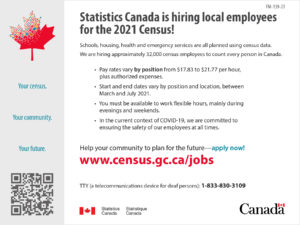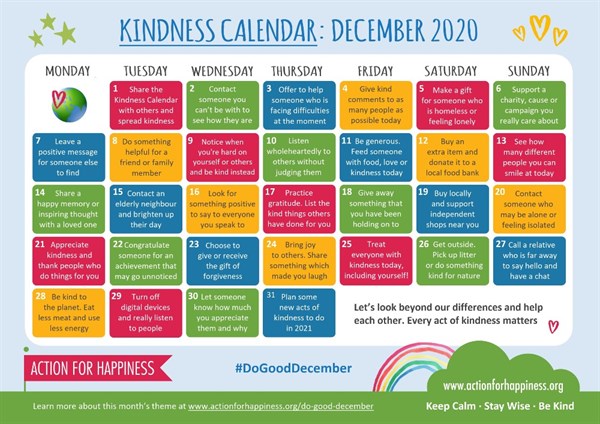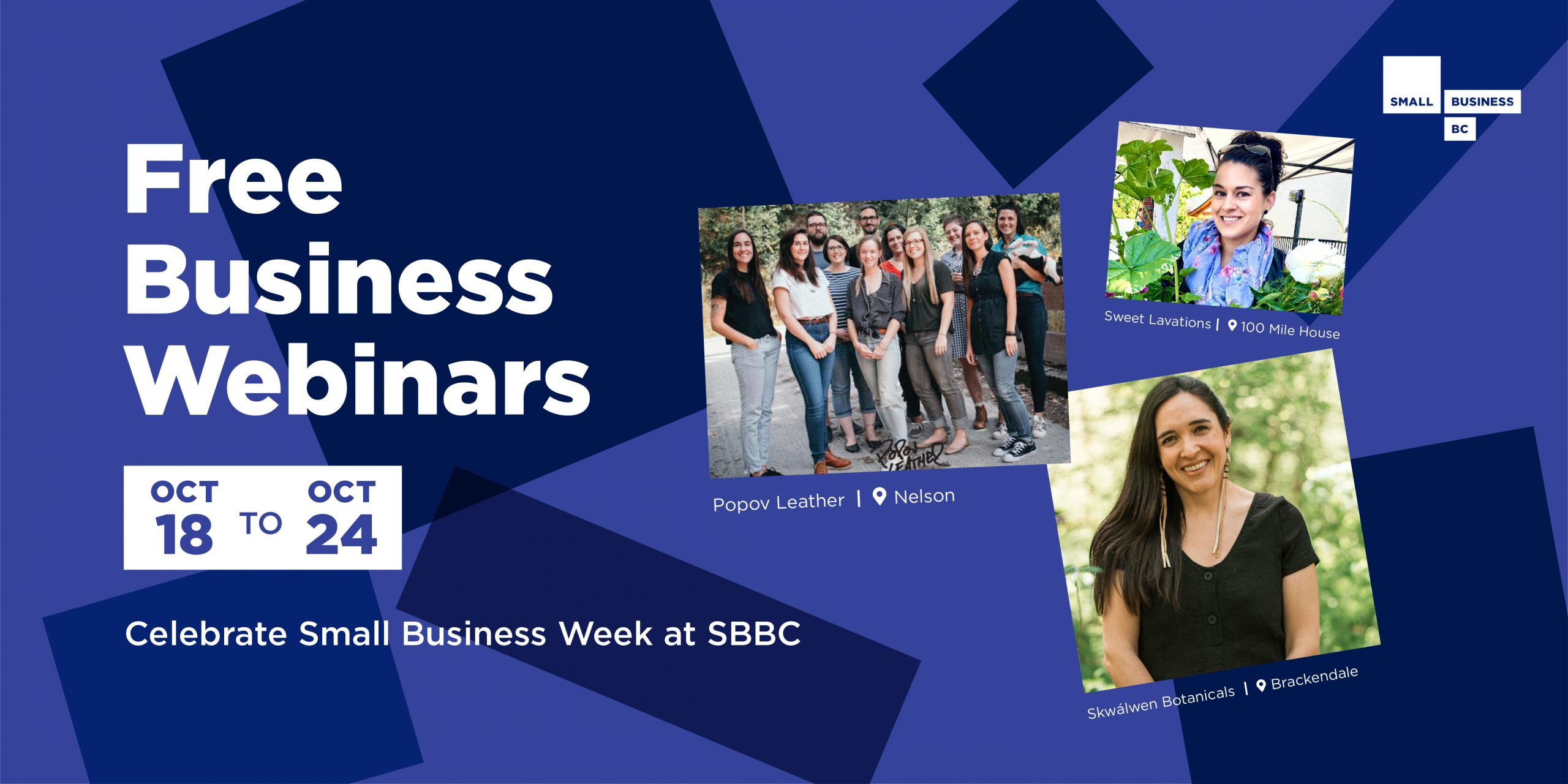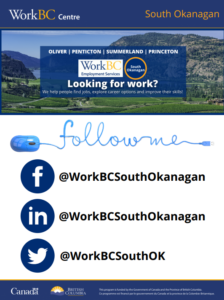
COVID-19 | We have opened our office again and have implemented some COVID-19 safety protocols. Learn More
happening
It’s Census time folks…Apply NOW!!!
Canada is Hiring!!!
#32,000 jobs available to Canadians!
The census paints a portrait of Canada’s population and the places where we live. Information from the census will ensure that your community has the data it needs for planning schools, daycare, housing, hospitals, emergency services, roads, public transportation, and employment skills training.
Statistics Canada is currently hiring approximately 32,000 people for census enumerator and crew leader positions across Canada. Be part of a great undertaking and join the 2021 Census team!
JOIN THE CENSUS TEAM HERE!!!
BC Recovery Benefits Available NOW!!
BC RECOVERY BENEFITS!!

Apply now for the BC Recovery Benefit, a one-time, tax-free payment of up to $1,000 for eligible families and single parents and up to $500 for eligible individuals. You have until June 30, 2021 to apply.
Last updated: December 22, 2020
On this page:
- How the benefit works
- Determine your eligibility
- What you need to apply
- Submit your application
- After you apply
- Repayments
How the benefit works
The BC Recovery Benefit (the benefit) is a one-time direct deposit payment for eligible families, single parents or individuals. Benefit eligibility is based on net income from your 2019 tax return. You must apply to receive the benefit.
Benefit rates
The amount you’re eligible for will be automatically calculated based on your income when you apply.
Families and single parents
- $1,000 for eligible families and single parents with a net income of up to $125,000
- Reduced benefit amount for eligible families and single parents with a net income of up to $175,000
The benefit defines a family as an individual and their spouse or common-law partner, unless they are separated. Both people must be residents of B.C. on December 18, 2020.
The benefit defines a single parent as an individual who is the principal caregiver to at least one child.
Individuals
- $500 for eligible individuals with a net income of up to $62,500
- Reduced benefit amount for eligible individuals with a net income of up to $87,500
Using 2019 income tax data
As with the B.C. Emergency Benefit for Workers, in order to prevent fraudulent claims, applicants must provide 2019 income tax data to receive the benefit.
British Columbians need support now, and if the benefit relied on 2020 income tax data, payment wouldn’t be possible until approximately fall 2021.
Determine your eligibility
General eligibility criteria
Generally, the benefit is available to people:
- Who are residents of British Columbia on December 18, 2020
- Who are at least 19 years old on December 18, 2020, or meet specific eligibility criteria
- Who filed a 2019 Canadian personal income tax return, or meet specific eligibility criteria
- Who have a valid social insurance number, individual tax number or temporary tax number
If you receive a payment and we later determine that you’re not eligible for it, you will be required to repay it.
Note: If you’re applying for the family benefit, your spouse or common-law partner must also meet the general eligibility criteria.
#DoGoodDecember
Action For Happiness
2020 has been a difficult year in so many ways. We have suffered with uncertainty, anxiety, isolation and challenges with our financial situation, health or relationships. One thing that can hold us together and help us get through is kindness. Although we can’t change our situation, we can choose to respond to others (and ourselves) with kindness. And when we’re kind, everything goes better. We help others, we help ourselves and we encourage others to be kinder too.
Giving also connects us to others, creating stronger communities and helping to build a happier society for everyone. And it’s not all about money – we can also give our Time, Ideas and Energy.
So if you want to feel good, do good!
Download your Calendar here: DO GOOD DECEMBER
100% Feel Good…. xoxox From US to YOU~~~
It’s Your Money!
CRA Fact Sheets about benefits and Credits:
It’s your money! fact sheets from Canada Revenue Agency provide information about benefits, credits and deductions that can be obtained by regularly filing taxes “even if you have no income at all”; this information is tailored to several population groups. For hard copies please email Cayla Linaker, Canada Revenue Agency at Cayla.Linaker@cra-arc.gc.ca
For a wonderful resource check out University of Manitobas Resources for all:
Here are some Canada Revenue Agency Fact Sheets we have downloaded for you:
Why Women Are Quitting Work
The number of women in the workforce overtook men for a brief period earlier this year. But the uncomfortable truth is that in their homes, women are still fitting into stereotypical roles of doing the bulk of cooking, cleaning and parenting. It’s another form of systemic inequality within a 21st century home that the pandemic is laying bare.
Women are seeing the fabric of their lives unravel during the pandemic. Nowhere is that more visible than on the job.
In September, an eye-popping 865,000 women left the U.S. workforce — four times more than men. We are seeing a similar trend in Canada as well.
The coronavirus pandemic is wreaking havoc on households, and women are bearing the brunt of it. Not only have they lost the most jobs from the beginning of the pandemic, but they are exhausted from the demands of child care and housework — and many are now seeing no path ahead but to quit working. More on this here.
At The Princeton & District Skills Centre we observe trends in Employment, Unemployment and all of the Themes that surround these topics and how it effects the labour market. We thought this could spark interesting conversations and perhaps lend some levity to what some families could be experiencing.
Its BC Small Business Week!
Celebrating Small Business in Princeton!
October is shining a spotlight on the resilient and rugged Small Business’s of our Area! We also know that the work is never done and attending training can be near impossible now more than ever! We have featured Small Business BC here and if you CLICK the image below you can see the bounty of resources available at your fingertips! Attend a workshop, live seminar or catch up some inspiring reading to build the depth of your competency. You have been tested and we see you! Now lets celebrate your success and ability to be unsinkable!! Bravo Business… Bravo!
October Small Business Week
Small Business BC is joining the national celebration of Small Business Week by offering FREE access to webinars occurring from Monday, October 19th to Friday, October 23rd. Demand is expected to be high, so register now to avoid disappointment. When individual sessions reach capacity, we will be opening a waitlist.
At Small Business BC, our number one priority will always be the health and safety of our clients, staff and service providers. As a result, we continue to deliver all our services online, or over the phone until further notice. View our resources for getting Back to Business, or connect directly with a business advisor through our COVID-19 Support Service.
Please note: all webinar participants will also receive access to a recording for seven days after the live session.
Self Care Tips for Leaders

This.
Self Care
At The Skills Centre we see a wonderful cross section of our community workforce and one thing is clear… Self Care seems to come last on the To-Do List when it comes to investing in and managing your career, your training, and your staffing. We know you can’t mandate a new “health” program unless its driven intrinsically, however we hope your hearts and minds can take a breath to discover the ultimate leverage in managing all things relating to Adulting, SELF CARE. Nobody is going to do this for you… It’s part of the fine print as you sign into this messy place and space of the Human condition and contract.
These self-care tips can help you prioritize your mental and emotional well-being so you can continue leading the business of learning both during and after the pandemic.
1. Stick to a Routine
COVID-19 has put many aspects of our daily routines — such as listening to podcasts on the way to work or heading to a workout class after leaving the office — on hold. As a result, it is difficult to “draw the line between when work begins and when it ends,” says Dr. Laura Hamill, chief people officer and chief science officer at Limeade.
Haesue Jo, LMFT, clinical support lead at online counseling platform BetterHelp, echoes this sentiment. “It’s really easy right now, because we’re staying home, to let go of any sense of structure or routine,” she says. One of the best ways to maintain mental and emotional wellness when working remotely is to implement and stick to “some kind of structured routine,” Jo adds. Simple actions, like waking up at the same time you normally would, taking regular lunch breaks or simply enjoying a cup of coffee on the porch each morning, can create structure and, in turn, improve productivity.
Sticking to a routine can also help you “shut off” after hours, which can be difficult now that “we no longer have boundaries between home and work,” Jo says. Hamill suggests adopting a “regular ritual” that signals the end of the workday, whether it’s taking a walk or simply leaving your laptop in your workspace.
2. Don’t Forget the Basics
Self-care doesn’t have to mean taking lavish vacations or indulging in expensive spa days. Some of the best ways to take care of ourselves are simple: getting enough sleep, exercising regularly and eating healthy foods. “These are some of the pillars of wellness, because if you’re not feeling well physically, it’s definitely going to impact your mood and ability to perform,” Jo says. A RAND study found that a lack of sleep among the U.S. workforce is a $411 billion problem, causing employees to miss 1.2 million working days each year. As a learning leader, it’s critical to take care of yourself so you can help others achieve their goals.
Hamill suggests making time for “what fuels you,” whether it’s going outdoors, enjoying a family meal or spending time with a pet. Dauer says simple actions like “pausing with intent” at intervals throughout the day can help clear your head, leaving you better able to tackle the next task on your to-do list. To perform at our highest capacity in all areas of our lives, “everyone, as much as humanly possible right now, should be prioritizing their physical and psychological well-being, paramount to all else,” Dauer says.
3. Ask For Help if You Need It
Self-care can help reduce stress and anxiety, especially during times of uncertainty. However, it’s important to regularly assess your mental and emotional well-being to determine if and when you should seek professional help. This self-assessment is easier said than done, however. Scott Roy, chief executive officer and co-founder of Whitten & Roy Partnership, says, “It’s very easy for us as human beings to slip into ‘autopilot’ — doing things the way we do them, regardless of how we feel.” The first step toward improving your mental and emotional health is “waking up” to the fact that you’re overwhelmed, he says. Mental health assessments can help you understand your current emotional state so that you can determine a proper course of action.
Online counseling services make it possible to speak with a licensed therapist “from the safety of your own home,” Jo says. Since the pandemic started, there’s “definitely been an increase” in people seeking remote counseling due to COVID-related anxiety and stress. In fact, in Morneau Shepell’s Mental Health Index, 75% of respondents reported that the pandemic has had a “negative impact” on their mental health.
If you’re struggling with a mental illness, Cornerstone OnDemand recommends talking to your manager so you can work together to find solutions to help you continue working to the best of your ability. Dauer says it’s “completely reasonable” to set expectations with your manager regarding when you need uninterrupted time to focus on important projects and when you need time to decompress.
Hamill agrees it’s important to “speak up” and “be real” with your manager about how you’re feeling and what accommodations could help you better navigate this uncertain time. Talking about your mental health with your manager is an exercise in vulnerability but, ultimately, can help you get the support you need.
As the pandemic continues to alter our personal and professional lives, Dauer says it’s “absolutely imperative” to practice self-care every day. Prioritizing your mental and emotional well-being will leave you better positioned to serve your learners at a time when learning has never been more vital to business outcomes. And remember: Our lives are not normal right now. “We are all doing the best we can given the circumstances,” Hamill says. “Give yourself grace.”
Click on the image below to reveal an excellent set of resources for managing anxiety~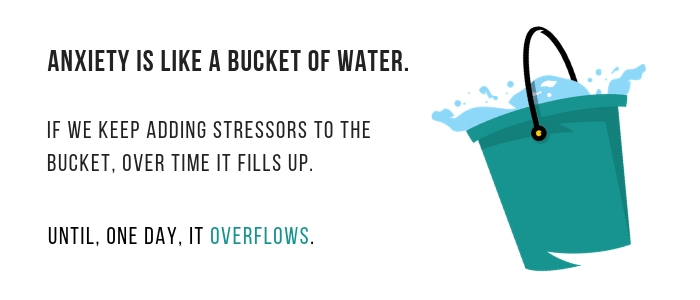
Welcome to your Polling Place Princeton!
We are happy to announce that we will be the home of the Advanced Polls!
BC Elections will be running advanced polls at our location 206 Vermilion Ave from 8 am till 8 pm, from October 15 till the 21st!
All of the Covid-19 protocols are in place, we offer ample parking, Rick Hansen certification for Accessibility, an enormous space and a central location to make us a great place for Elections BC. We are also the place to mark an X on voting day, so come on and make your voice heard Princeton!
We will see you next week!
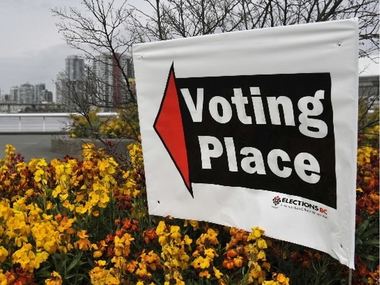
Hours
Monday to Friday
8:30 a.m. to 4:30 p.m.
